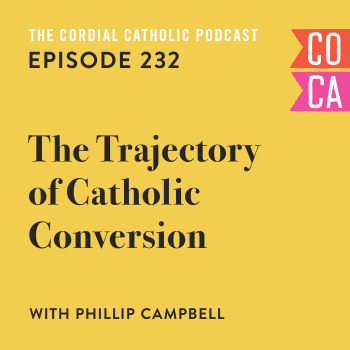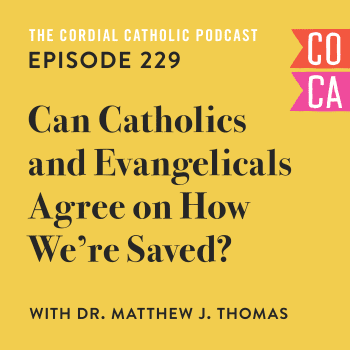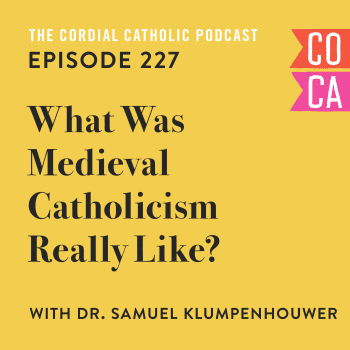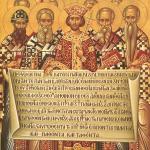
A stir was created, a few weeks ago, when a group of Lutheran clergy visiting the Vatican as part of the Week of Christian Unity received the Eucharist during a sort of ecumenical Mass.
The stir, while nothing more than a ripple in the global secular media created something much more like a tidal wave for Vatican watchers on all sides of the Christian Church.
Lutherans, Anglo-Catholics, and keen-eyed Evangelicals skeptically eyed an end to the Catholic Church’s so-called Closed Communion.
Traditional Catholics, at odds with some of the Pope’s seemingly “liberal” gesticulations, pointed to it as yet further evidence of a Church rapidly slip-sliding away.
Moderates on all sides took the events, as they unfolded, with a grain of salt.
As it turns out, according to an official clarification released by the Vatican, it came down to a misunderstanding. Yes, the Lutherans in attendance received the Eucharist. No, they shouldn’t have. It was a cultural misunderstanding and, says the Vatican, participants in the Mass are reminded that it’s best to simply stay in their seats if they’re not in a proper state to receive.
At any rate, crisis averted.
But such a situation serves as a poignant reminder of the situation in which we find ourselves. On one hand, the strong desire of those non-Catholics groups to receive the Eucharist alongside their Catholic brethren. And, on the other, the rightfully protective attitude many Catholics have towards something which is, theologically and materially, the very centrepiece of their faith.
In the end, nothing has changed. Such a position on the Eucharist, says the Vatican, won’t be changed “in the field” by priests administering the Host. More likely, says Cardinal Sarah, Prefect of the Congregation for Divine Worship and the Discipline of the Sacraments, nothing will change despite a strong desire for unity from many corners of the Christianity.
In other words, no, you can’t have the Eucharist.
And that’s OK.
See, the Catholic Church, for two thousands years, has had a relatively straight-forward understanding of the Eucharist. From Jesus’ own words, the Church understands the elements of bread and wine to be Jesus’ actual flesh and blood.
In tandem, and despite a split about a thousand years ago, the Eastern Orthodox churches hold to this same sacred theology. Jesus Christ is really present in the Eucharist.
This is why an Orthodox Christian may receive the Eucharist in a Catholic Church.
But beginning around the Reformation, Protestant groups which made a decided split from the Catholic Church began to reject this understanding of the Eucharist. Luther made unilateral modifications to his theology of the Eucharist and taught his followers likewise, Calvin would dither but essentially distance himself and his theology even further from the Catholic understanding, and the Anabaptist sects would reject flatly the idea of Christ being really present in Communion.
And so here we ago, on the cusp of the 500-year anniversary of the ostensible beginning of the Reformation and we are the inheritors of this fragmented history, and theology.
And the thing is, it’s OK.
Because the Catholic Church has a particular understanding of what’s taking place in the Eucharist. It’s sacred. It’s holy. And it must be taken with a measure of seriousness. This is clear from St. Paul in his epistles, and the Church has taken him at his word.
For the faithful Catholic, Communion can’t be received unless one is in a state of grace (achieved by a healthy habit of regular reception of the Sacrament of Reconciliation).
For the non-Catholic Christian, Communion simply cannot be received.
And that’s OK.
Because we’re called to live in this particular tension.
The Catholic Church says, “This is Christ’s body,” in the same way that Christ said, “This is my body,” and for those that don’t accept such a challenging reality then the Eucharist should not be received.
But what might, at first blush, seem like an overly zealous church jealously protecting its own is actually an overly careful, faithful institution protecting its greatest gift. A gift that, says our earliest teachers like St. Paul, must be given very thoughtfully and not abused.
It’s a tension we must live in: that there are Christians who decided to reject the theology of the Eucharist.
That there are Christians today who have inherited that rejection.
Through no fault of their own.
This is the tension, and that’s OK.
Because the tension highlights something greater and as we approach this 500th anniversary of what began it all we need to reflect, more deeply, and more earnestly, on the division in which we find the Christian Church. The millions of fragmented pieces. And to reflect on Christ’s charge: That they’ll know we’re Christians by our unity.
And how.
And in this tension—where what I understand about Communion is not what you understand about Communion—we do everyone a disservice by merely papering over our differences. Instead, it’s this tension we must embrace because it’s this tension—this awkward friction—which serves as a catalyst for all us Christians to do something about it.
Recently, the Anglican Communion is a perfect example of this tension in which we live. After their decision to begin performing same-sex marriages in the United States, the Episcopal Church was sanctioned by the larger Anglican body when they met at Canterbury. Forbidden from taking part in votes and having a formal say on committees the Anglican Communion is using the tools at its disposal, after much discussion amongst its leadership, to force the dissenting Episcopal body to live in the tension that they’ve created.
The Episcopal Church has chosen to move away from traditional Anglican theology, teaching, and practice, and the Anglican Communion has responding by saying, “This is your choice, but it has ramifications, and an impact on our unity.”
Likewise for Catholic/Non-Catholic understandings of the Eucharist.
And although the moving away from a traditional understanding of the Eucharist took place over a much longer stretch of time, and much more further into our collective past, its ramifications are no less prescient. But that’s OK. Because in the same way that the Anglican Church is forced to live in the tension surrounding same-sex unions, the Catholic Church, and those who broke communion, are forced to do the same. And it’s precisely that tension which must be keenly felt, and desperately overcome, if we’re ever going to find our way back together again.
So there you have it. No, you can’t have the Eucharist because you’re not Catholic; you don’t subscribe to a theology of the Eucharist that respects what the Church says that it is. And, likely, it’s no fault of your own and that is difficult and awkward and sad but that is what it is. And it’s OK.
Because the Catholic Church, and this Pope in particular, desperately wants you back.
Even 500 years later.
The call is to Communion and an ancient understanding of it and, until then, the awkward conversations we have with our non-Catholics friends and family every time they attend Mass isn’t meant to serve as an insult or an injury or a slight but as a recognition of a broken unity, a fractured past, and a tension in which we must work and build and live.
Stay in touch! Like The Cordial Catholic on Facebook:













